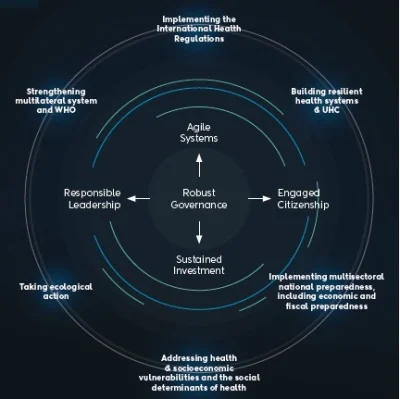The Global Preparedness Monitoring Board (GPMB) has released its second report ‘A World in Disorder,’ in which it harshly criticises the global response to the COVID-19 pandemic.
You might also like:Assessing COVID-19 Response
Created in 2017 and
formally launched in 2018, the GPMB is an independent monitoring and
accountability body ensuring preparedness for global health crises. In its
first ‘A World in Disorder’ report published in September 2019, the group highlighted
the unpreparedness, on the global level, to an inevitable pandemic of a
respiratory pathogen that could kill millions and wipe out 5% of the world’s
economy. The GPMB called for urgent action to be taken across the world so as
not to repeat the situation of “panic and neglect” that prevailed during past health
crises.
The current report builds on the previous document in the context of the COVID-19 pandemic. The authors point out “a collective failure to take pandemic prevention, preparedness, and response seriously and prioritize it accordingly” by the national and international bodies, the lack of leaders’ accountability in their actions, and the dependence on geopolitical issues that undermines the necessary multilateral action.
The report stresses
the importance of prevention estimating that the loss from the current pandemic
is comparable with the cost of pandemic preparedness measures taken over the
period of 500 years. It predicts that the COVID-19 socioeconomic consequences
will be long-lasting. The current, and counting, cost of COVID-19 response is
estimated to be over €9 trillion (US$ 11 trillion) while the future loss could
be up to €8.5 trillion (US$ 10 trillion) in earnings. As a result, sustainable
and predictable financing for preparedness is urgently needed.
The authors conclude
that “No-one is safe until all are safe.” They call for action on a global
scale, and highlight the following major directions.
Responsible
leadership – decision-makers should act early and base their actions onscience,
evidence and best practice. Any politicisation of health emergencies should be
avoided. The preparedness policies and efforts must be co-ordinated on both
national and international levels, and across governments, industry players and
international organisations, particularly when it comes to fair vaccine
allocation.
Engaged
citizenship –empowered citizens can hold their governments accountable for their
actions while each individual is responsible for their own and their immediate community’s
education and behaviours.
Strong and
agile national and global systems for global health security – for the governments, the
necessary elements of national policies include strengthening national systems for
preparedness, ensuring availability of core public health capacities and
workforce for surveillance and clinical services, as well as establishing
systems of social protection for vulnerable populations; the research sector
and international agencies should improve coordination and develop policies for
adequate response to health emergencies; also, governments should support WHO inits actions on pandemic preparedness and response.
Sustained
investment in prevention and preparedness, commensurate with the scale of a
pandemic threat – sustainable financing must be provided by all stakeholders alike, from
national governments to international organisations, to
mitigate the current and future pandemics’ impact, establish mechanisms for global
health security and support global R&D for health emergencies.
Robust global
governance of preparedness for health emergencies – International Health
Regulations must be updated to include the lessons learnt from the COVID-19 pandemic
while internationals agencies and their leaders should agree onan international framework for health emergency preparedness and response
though a UN Summit on Global Health Security.
“We have already learned many crucial lessons that demand immediate action if we are to say with any confidence, ‘never again’. But learning without action is pointless, and unsustained commitment is futile,” the GPMB experts conclude. “Failure to learn the lessons of COVID-19, or to act on them with the necessary resources and commitment, will mean that the next pandemic, which is sure to come, will be even more damaging.”
You can read the full report here.
Source: WHO
Image credit: GPMB


![Tuberculosis Diagnostics: The Promise of [18F]FDT PET Imaging Tuberculosis Diagnostics: The Promise of [18F]FDT PET Imaging](https://res.cloudinary.com/healthmanagement-org/image/upload/c_thumb,f_auto,fl_lossy,h_184,q_90,w_500/v1721132076/cw/00127782_cw_image_wi_88cc5f34b1423cec414436d2748b40ce.webp)







